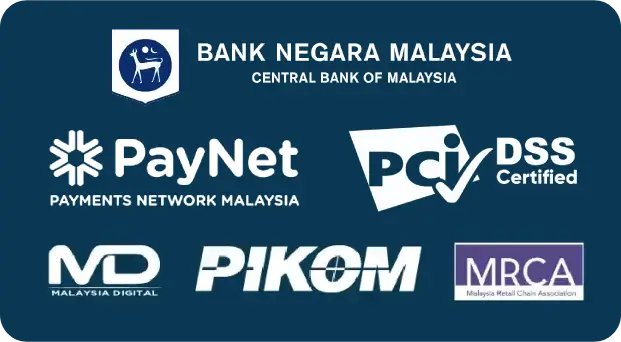
Direct debit is an automated way to collect payments directly from your customer’s bank account, no manual transfers, no reminders. In Malaysia, it works through FPX and eMandates, supported by most major banks and 支付网关 transactions.
If you’ve ever heard “Boss, I lupa bayar,” you know the struggle. When clients forget, delay, or keep giving excuses, your cash flow suffers. Bills pile up, staff still need to be paid, and it becomes harder to plan your month.
Enter, direct debit.
It gives you control, it’s fast, secure, and perfect for businesses that want to stop chasing and start collecting, on time, every time.
What Is Direct Debit?
Direct debit is a payment method where businesses can collect recurring payments directly from a customer’s bank account, with their prior consent, on a scheduled basis.
Unlike a manual transfer, where customers have to remember to pay you, direct debit automates the process using an eMandate approved by the customer and their bank.
It’s not a credit card transaction. It’s a bank-to-bank pull, and once set up, it’s a low-friction way to ensure timely payments.
How Does Direct Debit Work in Malaysia?
It all starts with a one-time eMandate, a digital authorization that lets you collect payments automatically from your customer’s bank account.
Once approved, your payment system takes care of the rest.
Here’s how the process works, step by step:
Step 1: Customer Fills Out the eMandate
The customer authorises your business by submitting an eMandate form, either:
- Online (via FPX gateway or embedded form)
- Or paper-based (less common, usually bank-issued)
This form links their account to your business for recurring payments.
Step 2: Bank Reviews & Approves
The customer’s bank reviews the eMandate and verifies that:
- The account is valid
- The customer consented
- The details match the FPX or provider system
Once approved, you’re cleared to start collecting.
Step 3: You Pull the Payment
On the agreed billing date (1st of every month), your system:
- Sends a direct debit request via FPX
- Automatically pulls the exact amount due from the customer’s bank
No manual action from the customer needed.
Step 4: You Get Paid
Settlement timing varies. DirectDebit collections run through PayNet clearing windows; final crediting depends on your provider and bank cut-offs. You can view the status in real-time through your provider’s dashboard.
In Malaysia, direct debit is powered by PayNet (Payments Network Malaysia) and works with most major banks, including Maybank, CIMB, RHB, Public Bank, and Hong Leong.
“According to The Edge Malaysia (Advertorial 2024), 61% of SMEs prefer direct bank transfers as their top digital payment method.”
Why Direct Debit Reduces Late Payments
Direct debit doesn’t just automate payments, it solves the issues that cause late payments in the first place.
Payments Are Made on Time, Automatically
Once the eMandate is approved, the system pulls the exact amount from the customer’s bank account on the scheduled date. There’s no need to remind, resend, or wait. Payments simply happen on time, without manual effort.
No More Time Wasted Chasing Invoices
For many small business owners, a big chunk of admin time goes into following up on overdue bills, texting, calling, and even WhatsApp-ing customers for e-invoicing matters.
With direct debit in place, that time is saved. Admin teams can focus on actual work instead of debt collection.
Healthier Cash Flow, Month After Month
When payments are consistent, business owners can plan with confidence. Salaries, rent, and expenses don’t have to rely on “who pays first”.
Direct debit brings more stability to cash flow, reducing financial pressure and uncertainty.
Smoother Customer Relationships
Sometimes the most awkward part of running a business is having to chase clients who haven’t paid.
It strains trust, especially with regular clients. With direct debit, that tension disappears, customers don’t have to remember, and businesses don’t have to remind them. Everyone wins.
“Across Asia-Pacific, the average payment delay was ~65 days in 2023 and 2024. Malaysia was among markets that saw increases.” – Coface , Asia Payment Survey 2024
Direct debit won’t fix every client, but it does remove forgetfulness and delay from the equation. For any business dealing with monthly fees or retainers, it’s one of the smartest tools you can add to your operational arsenal.
Is Direct Debit Safe for Businesses?
Taking money directly from a customer’s bank account might sound a little worrying at first, and that’s fair. Most business owners, especially those new to automated payments, wonder the same thing.
But rest assured: yes, direct debit is safe, as long as it’s set up through the right channels.
Backed by Malaysia’s Financial Framework
When a direct debit setup goes through a regulated payment gateway 或 licensed financial institution, it follows strict compliance standards, including:
- Bank Negara Malaysia (BNM) regulations
All participating institutions must follow BNM’s guidelines for secure recurring payments. - Customer-controlled eMandates
Payment can only happen after the customer explicitly authorises it via an eMandate (electronic approval). - FPX and PayNet infrastructure
Payments are processed through FPX, operated by PayNet, the same platform trusted for online banking nationwide. - Full cancellation rights
Customers can revoke the eMandate at any time by notifying their bank or the payment provider.
Choose a Trusted Provider
For added peace of mind, always go with a provider that offers:
- Transparent terms and cancellation options
- Real-time dashboards to track transactions
- Audit logs in case of disputes or chargebacks
A good payment processing system makes it safer for both sides, not just the business collecting payment, but also the customer who’s paying.
Who Should Use Direct Debit in Malaysia?
Although we sing praises for direct debit, it isn’t for every business. But for those offering recurring services, it can be a game-changer. Here’s where it fits best:
Service Providers on Monthly Retainers
Industries like accounting, marketing, legal, and consulting often bill clients on a fixed monthly basis.
Direct debit ensures these invoices are paid automatically and on time, removing friction from long-term client relationships.
Subscription-Based Businesses
From gyms and software-as-a-service (SaaS) platforms to online tuition centres, any business offering monthly or annual plans can use direct debit to simplify payment collection and reduce churn due to missed payments.
Instalment or Utility-Style Products
Companies selling products through monthly instalments (solar panels, water filters, broadband packages) benefit by securing consistent payments without chasing customers each cycle.
Who Should Not Use Direct Debit
Walk-in Retail Stores
Shops dealing primarily in physical, face-to-face transactions won’t benefit much. Customers pay on the spot, no need for recurring billing setups.
One-Time Sales or Project-Based Invoices
If a business offers services on a per-project or ad-hoc basis, direct debit may not be worth the setup effort. Standard bank transfers or FPX links are often more efficient in those cases.
In short, if a business sends the same invoice every month, same amount, same client, it’s a strong candidate for direct debit.
Direct Debit vs Auto Debit: What’s the Difference?
Both auto debit 和 direct debit help businesses collect payments without manual transfers, but the key difference is where the money comes from
| Aspect | Direct Debit | Auto Debit |
| Source | Bank account | Credit/debit card |
| Setup | eMandate (via FPX/Bank) | Card details |
| Who Pulls | Business (on schedule) | Business (on schedule) |
| Best For | Fixed monthly billing | App-based or card subscriptions |
| Cancel Method | Via bank or FPX | Via card issuer |
| Regulation | Bank Negara + PayNet | Visa/Mastercard networks |
| Examples | Retainers, SaaS, instalments | Netflix, Spotify, insurance renewals |
- Direct Debit pulls money directly from a bank account (usually via FPX and eMandates).
- Auto Debit charges a credit or debit card.
Direct debit is generally preferred for fixed, predictable payments like monthly retainers, while auto debit is more common for card-based billing in online or consumer services.
Conclusion: Craft a Smoother Payment Experience
Late payments don’t just slow things down, they stall growth.
With direct debit, businesses:
- Improve the client experience
- Cut out monthly payment chasing
- Get paid on time, every time
At Paydibs, we equip SMEs and Malaysian businesses, big and small with the tools to collect payments faster, easier, and with full control.
- We built Paydibs Neo: A compact, all-in-one terminal that supports contactless cards, e-wallets, and BNPL, with dual screens and voice prompts for clear confirmations.
- We’re a direct FPX acquirer via PayNet: We’re a direct FPX acquirer via PayNet, one of only ten non-bank entities with direct access, enabling faster settlements, improved cost efficiency and fewer intermediaries
我们的 支付终端 system is made for Malaysian businesses looking to simplify their collections. So, don’t let late payments disrupt your cashflows and business operations.
Let’s talk.
Legal Disclaimer: All brand names, trademarks, and logos displayed on this website are the intellectual property of their respective owners. Their use herein is solely for identification purposes without written consent or direct affiliation from the respective owner.
Frequently Asked Questions About Direct Debit
What is the difference between direct debit and auto-debit?
Auto-debit typically refers to card-based charges. Direct debit pulls funds directly from a bank account using an eMandate.
Can I Cancel A Direct Debit?
Yes. Customers can cancel anytime by contacting their bank or provider.
Which Banks In Malaysia Support Direct Debit?
All major banks including Maybank, CIMB, Public Bank, RHB, and Hong Leong support PayNet-powered direct debit.
Is FPX Needed For Direct Debit?
No. Direct Debit (and eMandate) is a PayNet service that is separate from FPX. Some providers may use FPX for other checkout flows, but Direct Debit itself doesn’t require FPX to collect payments
What If A Customer’s Account Has Insufficient Funds?
The transaction fails, and some gateways may retry after 1–2 days.
Is There A Fee For Using Direct Debit?
Fees and settlement schedules vary by bank/gateway and merchant plan. Check your provider’s published pricing or agreement.
近期文章
- Payment Infrastructure in Malaysia: Practical Business Guide
- Malaysia SME Payment & Compliance Guide (2026)
- How to Reduce Online Payment Failures: 10 Common Causes & Fixes
- Paydibs – AltPayNet Partnership Advances Financial Connectivity and Inclusion Between Malaysia and the Philippines
- How to Record Payment Gateway Fees in Your Accounts (Malaysia Guide)
我们的合作伙伴 :






